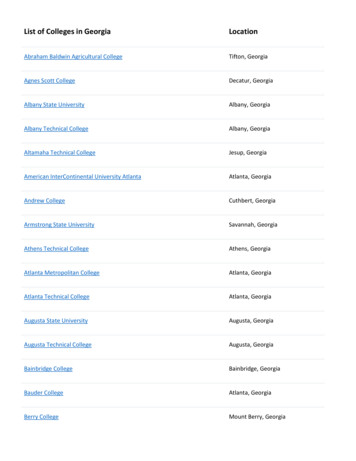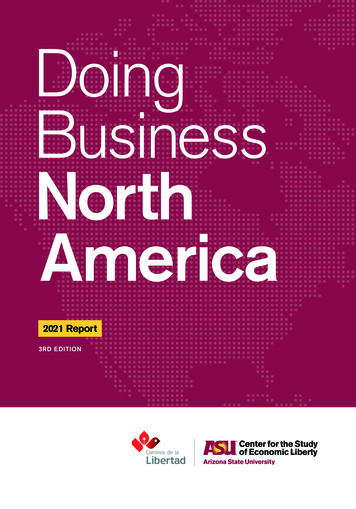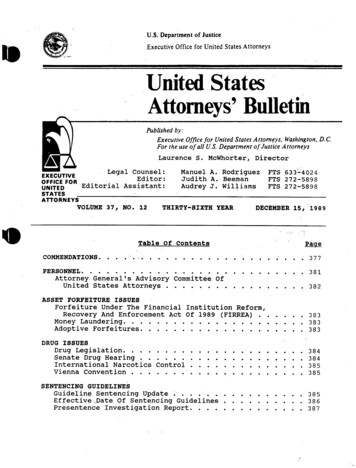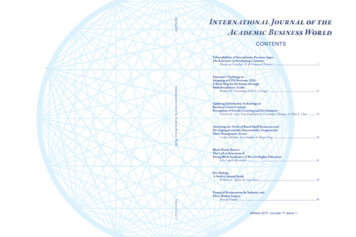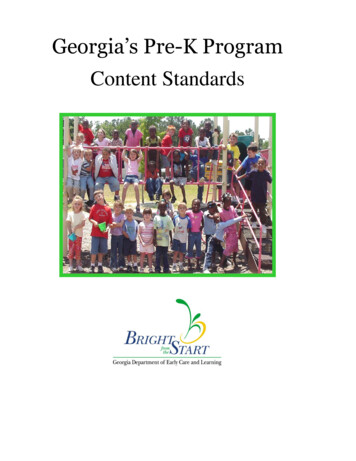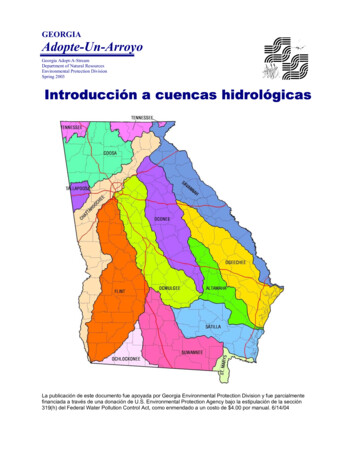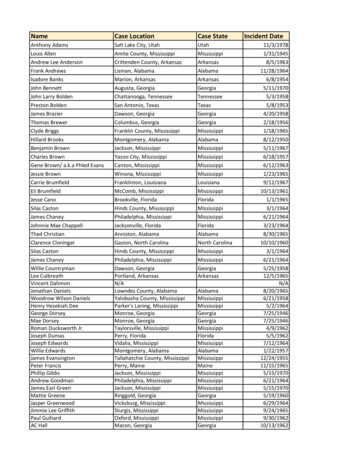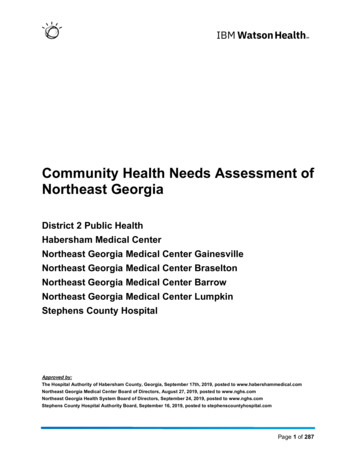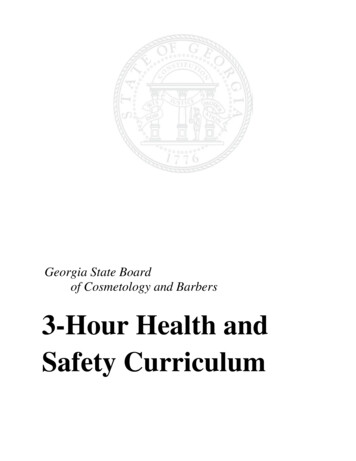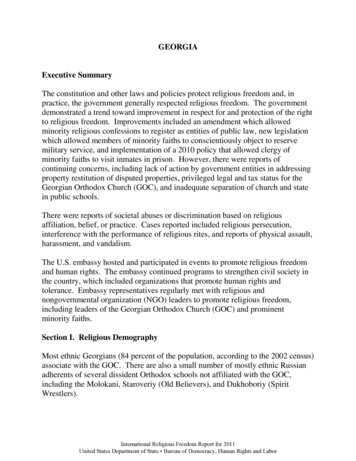
Transcription
GEORGIAExecutive SummaryThe constitution and other laws and policies protect religious freedom and, inpractice, the government generally respected religious freedom. The governmentdemonstrated a trend toward improvement in respect for and protection of the rightto religious freedom. Improvements included an amendment which allowedminority religious confessions to register as entities of public law, new legislationwhich allowed members of minority faiths to conscientiously object to reservemilitary service, and implementation of a 2010 policy that allowed clergy ofminority faiths to visit inmates in prison. However, there were reports ofcontinuing concerns, including lack of action by government entities in addressingproperty restitution of disputed properties, privileged legal and tax status for theGeorgian Orthodox Church (GOC), and inadequate separation of church and statein public schools.There were reports of societal abuses or discrimination based on religiousaffiliation, belief, or practice. Cases reported included religious persecution,interference with the performance of religious rites, and reports of physical assault,harassment, and vandalism.The U.S. embassy hosted and participated in events to promote religious freedomand human rights. The embassy continued programs to strengthen civil society inthe country, which included organizations that promote human rights andtolerance. Embassy representatives regularly met with religious andnongovernmental organization (NGO) leaders to promote religious freedom,including leaders of the Georgian Orthodox Church (GOC) and prominentminority faiths.Section I. Religious DemographyMost ethnic Georgians (84 percent of the population, according to the 2002 census)associate with the GOC. There are also a small number of mostly ethnic Russianadherents of several dissident Orthodox schools not affiliated with the GOC,including the Molokani, Staroveriy (Old Believers), and Dukhoboriy (SpiritWrestlers).International Religious Freedom Report for 2011United States Department of State Bureau of Democracy, Human Rights and Labor
GEORGIA2The Armenian Apostolic Church (AAC), the Roman Catholic Church (RCC),Judaism, and Islam have coexisted with Georgian Orthodoxy for centuries. Thereare strong correlations between ethnicity, religious affiliation, and region ofresidence. Overall, 10 percent of the population is Muslim. Azeris, who arepredominantly Muslim, constitute the second largest ethnic group (7 percent of thepopulation) and form the majority of the population in the southeastern region ofKvemo-Kartli. Other Muslim groups include the ethnic Georgian Muslims ofAjara and Chechen Kists in the northeastern region. Armenians are the thirdlargest ethnic group (6 percent of the population) and primarily belong to the AAC;they constitute the majority of the population in the southern Samtskhe-Javakhetiregion.Roman Catholics, Kurdish Yezidis, Greek Orthodox, and Jews together make upless than 5 percent of the population. Protestant and other “nontraditional”denominations such as Baptists, Jehovah’s Witnesses, Pentecostals, and HareKrishnas, who are growing in number, constitute less than 1 percent of thepopulation.Section II. Status of Government Respect for Religious FreedomLegal/Policy FrameworkThe constitution and other laws and policies protect religious freedom. Theconstitution recognizes the special role of the GOC in the country’s history but alsostipulates the independence of church from state. The law specifically provides forfreedom of religious belief, denomination, and conscience, including the right tochoose and change any religious denomination at will.A concordat between the government and the GOC confers unique status upon theGOC; the government does not have a concordat signed with any other religiousgroup. The concordat grants rights not enjoyed by other religious denominationsincluding providing legal immunity for the GOC patriarch, granting the GOC theexclusive right to staff the military chaplaincy, exempting GOC clergy frommilitary service, and giving the GOC a consultative role in government, especiallyin the sphere of education. However, some of its articles, including the GOC’sconsultative role in education, require parliament to adopt implementinglegislation, which was not done by the end of the year. The GOC is the onlychurch which has a line item in the government budget; it received 22.8 million lari( 13.6 million) during the year and expected to receive the same amount in 2012.International Religious Freedom Report for 2011United States Department of State Bureau of Democracy, Human Rights and Labor
GEORGIA3Although the tax code exempts religious organizations from many taxes, taxexemptions are not applied equally to all religions. The GOC is exempt fromseveral taxes that other religious organizations must pay. These include profit taxon the sale of religious products, value added taxes (VAT) on the provision orimportation of religious products, and taxes on all activities related to theconstruction, restoration, and painting of churches.In the context of the amended civil code, there are direct talks between the GOCand the government on the preservation of the GOC’s “special status,” its rightsoutlined in the concordat, the role of a parliamentary commission to monitorproperty transfers, and other GOC privileges outlined in the constitution and taxcode.The criminal code specifically prohibits interference with worship services,persecution of a person based on religious faith or belief, and interference with theestablishment of a religious organization. Violations of these prohibitions arepunishable by a fine, imprisonment, or both; violations committed by a publicofficer or official are considered abuses of power and are punishable by higherfines or longer terms of imprisonment.The Prosecutor General’s Office (PGO) is charged with prosecuting human rightsviolations, including religious freedom violations. The Human Rights Unit withinthe PGO is tasked with monitoring the protection of some human rights includingreligious freedom. The Public Defender’s Office (PDO), which serves as thehuman rights ombudsman, also monitors complaints of restrictions on religiousfreedom.By law, Orthodox teaching may take place only after school hours and cannot becontrolled by the school or teachers. Outside instructors, including clergy, cannotregularly attend or direct student extracurricular activities or student clubs and theirmeetings. Lay theologians, rather than priests, lead such activities.The government observes the following religious holidays as national holidays:Orthodox Christmas, Epiphany, Good Friday, Orthodox Easter, Easter Monday,the Day of Apostle Andrew, the Day of the Virgin Mary, Svetitskhovloba, SaintGeorge’s Day, and Nowruz-Bairam.Government PracticesInternational Religious Freedom Report for 2011United States Department of State Bureau of Democracy, Human Rights and Labor
GEORGIA4There were no reports of abuses of religious freedom. Implementation of newpolicies to further promote religious freedom improved, although some systemicissues remained largely unchanged such as the return and maintenance of disputedchurch property claimed by religious minority groups and currently held bygovernment entities, the privileged legal and tax status of the GOC, and inadequateenforcement of separation of church and state in public schools. Minority religiousgroups noted that local police response and prosecutorial investigations improvedduring the year.Except for the GOC, restitution of disputed property confiscated during thecommunist regime remained a contentious issue. RCC and AAC officials claimedproperty disputes were not resolved in a transparent legal process but rather on acase by case basis that distinctly favored GOC claims. They asserted thegovernment was unwilling to resolve disputes over the ownership of churchproperties for fear of offending GOC constituents. After passage of the 2011amendment to the Civil Code of Georgia on registration of religious organizations,the government announced the creation of a joint government-GOC commission tomonitor property transfers and the determination of cultural monuments ofreligious significance in accordance with the constitutional agreement. Thecommission included no representatives of minority religions. There is no officialmechanism which mediates property disputes among the GOC, minority religions,and the government. NGOs and members of religious minority groups were alsoconcerned about the maintenance of churches whose title was held by governmententities while ownership remained in dispute. Many of the properties were notbeing maintained and were falling into disrepair.The AAC’s main concern remained the return of five churches in Tbilisi and one inAkhaltsikhe, all claimed by both the AAC and GOC. However, the status of atleast 30 other churches claimed by the AAC remained in dispute. The RCCclaimed five churches which were given to the GOC after dissolution of the SovietUnion. The Jewish congregation and Muslim community also claimed mosques orsynagogues which were considered cultural heritage sites and owned by thegovernment.The Ministry of Culture allocated 9,895 lari ( 6,925) for renovation of a disputedchurch building, Mughni Surb Gevorg, claimed by the AAC which collapsed in2009. Although the 2010 restoration planning project for the church wascompleted during the year, the AAC reported no further action was taken on thechurch’s restoration. The Ministry of Culture spent 38,900 lari ( 23,200) forInternational Religious Freedom Report for 2011United States Department of State Bureau of Democracy, Human Rights and Labor
GEORGIA5preliminary documentation for restorative works on two other churches claimed bythe AAC during the year.A former mosque located in the village of Mukhaestate in the Kobuleti region wasdemolished in 2010 and a new police building was constructed in its place, whileanother former mosque in the town of Kobuleti was used as a film studio. In theAdigeni district, there were approximately seven inactive mosques built byMeskhetian Muslims deported during the Stalin era which were being used to keepcattle. According to the NGO Toleranti, the small Muslim community (composedmostly of migrants from Adjara) was not able to reclaim those mosques but usedother active mosques in the region.Restoration continued on GOC churches previously returned, in part throughgovernment subsidies on the grounds that the buildings were national culturalheritage sites. The government provided subsidies for the maintenance andpreservation of mosques on similar grounds. Other minority religious groupsclaimed the government did not provide funding on a neutral and equitable basis.During the year, the Ministry of Culture provided 3.5 million lari ( 2.1 million) forthe restoration of religious buildings on cultural heritage sites and claimed 48.6percent of the funding, or 1.7 million lari ( 1.04 million), was spent on buildingsclaimed by minority religions.Passage of the religious registration amendment permitted improvements onproperty issues in some areas. Several properties not claimed by more than oneconfession nor considered cultural heritage sites were in the process of beingreregistered. Other properties owned by the government as cultural heritage siteswere leased to their respective congregations.During the year, several churches, mosques, and meeting halls were in the processof being reregistered to minority religions, including groups which hadsuccessfully registered under the new amendment as legal entities of public law.Representatives from the Muslim community reported most mosques were in theprocess of being reregistered under the Administration of All Muslims of Georgia,but none of the registrations had been completed at year’s end. Six churches werein the process of being reregistered to the RCC.At the end of the year, three branches of the RCC, the Administration of AllMuslims of Georgia, Lutherans, Yezids, and one Jewish organization hadregistered as legal entities of public law. Other minority religions which had notInternational Religious Freedom Report for 2011United States Department of State Bureau of Democracy, Human Rights and Labor
GEORGIA6registered at the end of the year included the AAC, Baptists, Seventh-dayAdventists, Jehovah’s Witnesses, and other Jewish organizations.Both synagogues in Tbilisi remained state property. One newly renovatedsynagogue continued to be leased to the community for the symbolic price of onelari ( .60) per month. A Catholic church in Rabati, in the Akhaltsikhe region, hadnot been returned to the RCC by the end of the year, but continued to be leased fora symbolic price for the next 100 years.Property issues related to issuance of construction and occupation permitsimproved during the year. Construction permits for two new mosques in Marneuliand restoration of one mosque in Gardabani were issued during the year. TheJehovah’s Witnesses were issued two permits. In contrast to 2010, there was onlyone reported difficulty with a construction permit during the year. In February theJehovah’s Witnesses requested the renewal of a construction permit in Signaghipreviously issued in 2009 that had expired. At the end of the year, the permit hadnot been issued and no reason for the delay was given. However, the Jehovah’sWitnesses noted that during the year they began reregistering buildings under thename of the organization rather than that of a private individual because they feltthe previous issues with permit delays had been resolved. The RCC, the AAC, andseveral Protestant denominations reported that issues in 2010 regardingconstruction permits were resolved during the year.Prior to December legislation allowing alternative service for reserve military duty,minority religions reported 10 cases for which exemption or alternative service forreserve military service was not granted. Alternative service was already permittedin place of compulsory active military duty. In cases in which alternative servicewas granted for active military duty, there were no reports of problems gettingalternate service work plans approved by the Ministry of Labor; however, theMinistry of Defense denied the initial requests for exemptions as well as follow upappeals in several requests for alternatives to reserve military duty. The Seventhday Adventists reported four members of their community were fined 500 lari( 301) each for not meeting the mandatory reserve service requirement. Jehovah’sWitnesses reported five members were fined. The Jewish community reported onemember was initially denied alternative service, but later granted alternativeservice by the end of the year. Appeals were pending in three of the Jehovah’sWitnesses cases. Jehovah’s Witnesses leaders reported that after the Decemberruling, the Tbilisi mayor’s office reassured them that their two pending requests foralternative service would be granted.International Religious Freedom Report for 2011United States Department of State Bureau of Democracy, Human Rights and Labor
GEORGIA7The PDO reported continuing problems with teachers reinforcing Orthodoxtheology through religion courses, classroom prayer, and the display of icons andother religious symbols in schools.Members of minority religions reported several cases of high school religionhistory courses being taught as Orthodox catechism courses. The PDO receivedcomplaints from several religious minority families that some schools displayedGeorgian Orthodox religious objects in schools. A December 2010 letteraddressed to the Ministry of Education from the PDO requesting such objects beremoved received no response. Although the Ministry of Education has a GeneralInspection Department to deal with complaints of inappropriate teacher behavior,including violations of the religious freedom of students, it reportedly did notrespond to such complaints.There were no official reports made to the PDO that public school teachers or localOrthodox priests had criticized minority religious groups, interfaith marriages, orRoman Catholic and Protestant students. However, representatives from non-GOCconfessions and the PDO’s Tolerance Center continued to believe that suchproblems persisted despite the lack of documentation of official complaints.School staff assumed a child was Orthodox Christian unless teachers wereinformed otherwise. Some members of religious minority groups remarked thatparents found the school environment better for their children if their householddid not announce its religious affiliation in its community.The Ministry of Corrections and Legal Assistance took steps during the year tomake access to penitentiary institutions equitable for representatives of all religiousorganizations and to provide for religious worship by inmates of all confessions.Clergy of minority confessions reported substantial improvements as a result of aDecember 2010 order that guaranteed the right of religious worship to prisonersand detainees, including the right to have a space for worship, the right to meetwith clergy of any confession, and the right to retain religious objects. No clergyof any religious organization reported problems in visiting prisons this year.Most prisons are equipped with Georgian Orthodox chapels; however, there are nospecific nondenominational areas for worship. Representatives from religiousminority confessions complained that prisoners of minority faiths were not givenadequate areas within penitentiaries to practice their religious beliefs. Accordingto Muslim leaders, during the Muslim holy day of Bairam, Muslim prisoners werekept in general cells with other inmates, making worship impossible. Both theInternational Religious Freedom Report for 2011United States Department of State Bureau of Democracy, Human Rights and Labor
GEORGIA8public defender’s staff and the Ministry of Corrections and Legal Assistancereported they were working to find a solution. Members of the Jewish and Muslimcommunities also reported kosher and halal dietary accommodations were notmade for their members. Several minority religions reported that GOC priestsactively proselytized in prisons.The PDO reported that religious minorities lodged six complaints of bothgovernmental and societal violations against their religious rights during the year.Police were quick to respond to most incidents of abuse.The occupied territories of Abkhazia and South Ossetia remained outside thecontrol of the central government, and reliable information from those regions wasdifficult to obtain. A 1995 decree issued by the de facto Abkhaz leader thatbanned Jehovah’s Witnesses in the region remained in effect. Jehovah’s Witnessesleaders in undisputed Georgia did not possess current information regarding thesituation in Abkhazia.Baptists, Lutherans, and Roman Catholics reported that they were allowed tooperate in Abkhazia. The GOC reported that it was unable to do so, and the twobranches of the Abkhaz Orthodox church do not recognize GOC authority. TheGOC and government officials alleged that the de facto Abkhaz authorities carriedout restoration work on churches historically claimed by the GOC that eliminatedGeorgian architectural elements. The GOC and government officials alleged thatrestoration work on the Bedia monastery destroyed a historic Georgian fresco, andrenovations to the Ilori Church covered Georgian inscriptions with paint andaltered unique Georgian architectural elements.The Christian Orthodox Church in South Ossetia was the primary religiousorganization and did not recognize GOC authority. In South Ossetia, GOCadherents remained unable to hold services in GOC churches, located near theethnic Georgian villages of Nuli, Eredvi, Monasteri, and Gera, because these areaswere under the control of de facto South Ossetian authorities. Individuals livingoutside Abkhazia and South Ossetia faced difficulties crossing the administrativeboundaries and were therefore limited in their ability to visit the gravesites offamily members inside the territories, especially in South Ossetia. Some visitswere allowed on an inconsistent basis, particularly on religious holidays.During his speech on International Tolerance Day on November 24, PublicDefender Giorgi Tugushi highlighted ongoing problems, including anti-Armenianstatements made by Orthodox clergy, politicians and other individuals afterInternational Religious Freedom Report for 2011United States Department of State Bureau of Democracy, Human Rights and Labor
GEORGIA9passage of the religious registration law and which were subsequentlydisseminated in the media; the unresolved ownership status of many churchesconfiscated from various religious communities during the Soviet period; anunequal tax regime which favors the GOC; and continuing challenges to separationof church and state in public schools. However, Tugushi also highlighted areas ofimprovement, including passage of the July religious registration amendment, anoverall decrease in religious discrimination, improved access to prison visits byclergy of minority religions, and increased attention to the importance of religiousand ethnic minorities by authorities of the Georgian government.Improvements and Positive Developments in Respect for Religious FreedomOn December 21 the Constitutional Court ruled in favor of an appeal submitted bythe public defender that allows citizens to apply for an alternative to reservemilitary service, based on religious, ethical, and other grounds. Alternative servicewas already permitted in place of compulsory active military duty.On December 21 the prosecutor’s office initiated an investigation of a GeorgianOrthodox priest for religious persecution of four Jehovah’s Witnesses in Kareliwho had been subjected to repeated physical and verbal assaults. The PDO notedthe investigation represented a significant precedent in the equal treatment of allreligious organizations because religious persecution is a criminal offense. Inprevious years, GOC priests were not investigated in similar incidents and suchattacks were predominantly qualified as hooliganism by prosecutorialinvestigators, and thus fell under a different category of offense entailing lighterpunishments. The investigation was ongoing at the end of the year.The PDO hosted a roundtable on hate speech on July 28 in response to the surge ofxenophobic statements following passage of the religious registration amendment.The discussion was attended by representatives from government ministries andcivil society. On November 24 the public defender recognized InternationalTolerance Day by honoring civil society actors and organizations working in thefield and reporting on the state of tolerance in the country. He noted the number ofreported attacks on religious minorities to the PDO decreased from 12 in 2010 tosix during the year.On July 5 Parliament passed an amendment to the civil code allowing any religiousgroup with historic ties to the country or recognized in a Council of Europemember state to register as a legal entity of public law, a status previously affordedonly to the GOC. Prior to passage of this amendment, religious groups wereInternational Religious Freedom Report for 2011United States Department of State Bureau of Democracy, Human Rights and Labor
GEORGIA10required to register as an NGO, a status that complicated property ownership andother operational issues. Registration is a function of the Civil Registry Agencyunder the Ministry of Justice and requires submission of a basic application packetand a fee of 100 lari ( 60). The new law does not address restitution of propertyconfiscated during Soviet times.With the adoption of the amended religious registration law, groups other than theGOC can be granted the status of “legal entity of public law” for the first time.The original draft law only envisaged registration privileges for groups withhistoric ties to Georgia, and the more expansive final draft was considered to be aresult of the government’s commitment to more inclusive legislation.Many elements of civil society, opposition parties, and the GOC as a wholecontinued to criticize the rapid manner in which parliament passed the religiousregistration amendment which they allege occurred without adequate consultationwith civil society. The government maintained that consultation had been ongoingfor several years.High level government recognition of minority religious celebrations alsoincreased during the year. In remarks made in the Armenian church in Tbilisi onJanuary 6, President Saakashvili said that the ethnic Armenian population ofGeorgia “is an integral part of Georgia’s national body, [and] Georgia’s statehooddevelopment.” President Saakashvili also celebrated Nowruz Bairam in theMuslim community of Marneuli, and noted, “It is very important to maintain ourAzerbaijani culture, our Azerbaijani language, which is an integral part of theGeorgian culture and of the Georgian state.”A Ministry of Corrections and Legal Assistance policy enacted in December 2010allowed minority religion representatives to visit imprisoned members without firstseeking permission of the Georgian Orthodox Church. The policy wasimplemented without issue.Section III. Status of Societal Respect for Religious FreedomThere were reports of societal abuses or discrimination based on religiousaffiliation, belief, or practice. Minority religious groups were viewed by some as athreat to the national church and the country’s cultural values. The president andother senior officials took steps to promote religious freedom. High levelgovernment recognition of minority religious celebrations increased during theyear. Government ministry representatives also increased participation inInternational Religious Freedom Report for 2011United States Department of State Bureau of Democracy, Human Rights and Labor
GEORGIA11roundtables with religious leaders and NGOs to improve dialogue regardingreligious tolerance.According to the Ministry of Internal Affairs, during the year one investigation wasopened under article 155 of the criminal code for illegal interference with theperformance of religious rites, and one case was opened under article 156 forreligious persecution.During the year, the Jehovah’s Witnesses reported four new cases of societal abusebut stated that police generally responded in a satisfactory manner to their calls.As noted above, a GOC priest in Kareli physically and verbally abused Jehovah’sWitnesses multiple times throughout the year, including blocking the road with hisvehicle, shoving them, attempting to confiscate their belongings, and verballyinsulting and threatening them. The investigation of the priest for religiouspersecution was ongoing at the end of the year.Of the 12 cases reported by the Jehovah’s Witnesses during the year, four wereresolved, three were still undergoing investigations at the end of the year, and fivedid not have investigations initiated.In August two men entered an Armenian church in Avlabari where they damaged aBible and started a fire in the courtyard. The AAC reported that the policeresponded promptly, and charged one man with hooliganism. Discussions betweenthe AAC and the men’s families resulted in charges being dropped. One familyissued a public apology, and the Armenian bishop gave a public statement ofreconciliation.There was a significant surge in media statements against ethnic minoritiesfollowing the July passage of the amendment allowing minority religiousorganizations to register as entities of public law. The PDO and NGOs reportedthat Georgian Orthodox clergy, some opposition party leaders, and members of theacademic community were among those who made such statements followingpassage of the law. The public defender also criticized major NGOs working onminority rights for their allegedly weak response to the surge in hate speechfollowing the adoption of this law and the media for its role in disseminatingexpressions of xenophobia. Following the passage of this amendment, profanegraffiti targeting Armenians appeared on a wall facing the Armenian church inAvlabari. Police initially refused to respond, stating the graffiti was on a privatebuilding; however, the mayor’s office intervened and the graffiti was quicklypainted over.International Religious Freedom Report for 2011United States Department of State Bureau of Democracy, Human Rights and Labor
GEORGIA12Section IV. U.S. Government PolicyThe U.S. embassy promoted religious freedom as a fundamental human right andessential element of democracy and engaged with religious communities from allfaiths. Embassy officials, including the ambassador, regularly met withrepresentatives of parliament, religious groups and leaders, and NGOs concernedwith religious freedom. The embassy promoted religious freedom and tolerancethrough the use of public diplomacy, including speeches and press interviews bysenior U.S. government officials and embassy representatives, and made publicstatements in support of the passage of the religious amendment allowing minorityfaiths to register as entities of public law.On December 9 the ambassador made remarks at a reception held in honor ofHuman Rights Day highlighting the importance of religious freedom.In July an embassy political officer met with the leaders of the newly establishedMuslim Department, and on October 26 an embassy political officer met with thelocal Akhund of the Marneuli Mosque and a representative of the MuslimDepartment in Shida Kartli.In June embassy staff attended a roundtable organized by the NGO 21st Century,with the participation of the Religious Council. The participants discussed taxcode reforms and outstanding issues for religious freedom in the penitentiarysystem.On May 31 the ambassador hosted a lunch for Patriarch of All Georg
GEORGIA . Executive Summary . The constitution and other laws and policies protect religious freedom and, in practice, the government generally respected religious freedom. The government demonstrated a trend toward improvement in respect for and protection of the right to religious freedom. Improvements included an amendment which allowed
